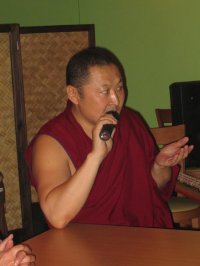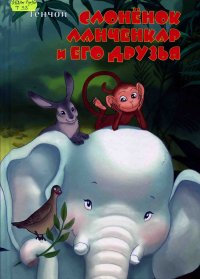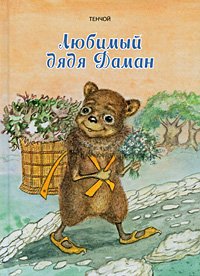|
 One of his books became the best children’s book of Russia in 2007. He is a Doctor of Buddhist philosophy, who studied in India at the Drepung Goman University. He graduated from the department of psychology at one of the colleges in Moscow. He has been visiting Tuva these past few days, accompanying the monks from the “Drepung Goman” monastery on their Russian tour. His Buddhist name, which was given to him by the Dalai-Lama XIV, is Tepchoy, which is short for Tenzin Choyzin – Keeper of the dharma and knowledge. One of his books became the best children’s book of Russia in 2007. He is a Doctor of Buddhist philosophy, who studied in India at the Drepung Goman University. He graduated from the department of psychology at one of the colleges in Moscow. He has been visiting Tuva these past few days, accompanying the monks from the “Drepung Goman” monastery on their Russian tour. His Buddhist name, which was given to him by the Dalai-Lama XIV, is Tepchoy, which is short for Tenzin Choyzin – Keeper of the dharma and knowledge.
- The stories you write are very unusual. Tell us, please, how you started to write.
- I started writing five years ago, because there was an obvious need for literature for children. Everybody liked the first book, “Stories for baby elephant Lanchenkar”. My heroes are four true friends – little elephant Lanchenkar, partridge Gonmo, hare Ruk, and monkey Cheu. I did not invent them – Buddha Shakyamuni himself did that. He used to explain his teachings even in stories, which were preserved to this day, under the name “Jatakas of the Buddha”. I simply took these heroes and invented entertaining stories for them. There are many riddles and humor in them, but for those who want to find Buddhist philosophy, it is there as well. Then I started writing some more. Altogether five children’s books have been published so far, already hard-covers.
- However, your books are read with pleasure not just by children, but by their parents as well.
 - Of course, adults can read them too; they also find something useful there. Even if they are not interested in Buddhism or know nothing about it. The second book, which is fuller, already contains 50 stories. It shows the Little Elephant’s road to Happiness. His happiness lies in helping others. Anybody who is familiar with Buddhist philosophy can find the law of cause and effect between the lines, which is the core idea of the Buddhist philosophy. - Of course, adults can read them too; they also find something useful there. Even if they are not interested in Buddhism or know nothing about it. The second book, which is fuller, already contains 50 stories. It shows the Little Elephant’s road to Happiness. His happiness lies in helping others. Anybody who is familiar with Buddhist philosophy can find the law of cause and effect between the lines, which is the core idea of the Buddhist philosophy.
- The chairman of the government of Tuva gave the books about little elephant Lanchenkar in particular to children with physical limitations. Have you been to Tuva before?
- Yes, several years ago. At the time I donated 200 specimens of the first and second books each. Later, three more books were published. I am co-operating with the head of your government, we talked about continuing to write and publishing more of the adventures of these heroes – he liked it. I will also give 200 specimens each of the fourth and fifth books to your representative office in Moscow.
- How do you successfully combine spiritual and worldly activities?
- Earlier, I was always involved with organization of charity Buddhist tours. But these past few years I have been just working creatively, writing and publishing books. The leader of the Tibetan monks’ delegation, Geshe-Lharamba Otog Rinpoche knows me personally, and he asked me to help out this year with the organization of constructing seven mandalas in Russia. I am trying to help, also in the capacity or a translator. This tour ends in Sankt-Peterburg.
- But you are not just a children’s storyteller…
- No… I also have stories about my spiritual teachers, known for their wisdom, who had unusual abilities – “Stories about the Chod practice” (Chod is cutting off; the yogis get rid of their “I”, their egoism). On my previous trip to Tuva I brought my book “Texts for everyday practice”, about thousand volumes. I heard that they all have been distributed. Every second person who comes to the Philharmony to the mandala construction, brought that book along. It is simply my contribution. I hope that the book will help the Tuvan people in spiritual development.
I am not a sociable, a worldly person. People know my books better than they know me. Altogether 16 books have been published, eight of those in the “Otkrytyi mir” publishing house.
As far as literature for children is concerned, it is a big problem here in the republic. There are problems with publishing it.
Yes, I Soviet times, there was much more written and published for children. I was in Trans-Baikal, in my native place. I was met by the governor’s administration. They were surprised how many books I had, and invited me to a writers’ conference as a guest of honor and as a local writer. If you have conferences of meets like that, I could come. I also designed my own writers’ workshop – how to write a story in one day. I have already conducted about 20 of these workshops, mainly in the Central federal Circle, for children 6 – 12 years old. I was invited to the administration of President of Russia in the capacity of an expert in culture. I travel through the country, meet with schoolchildren, and we write books together on various subjects. For the 65th anniversary of the Great Victory, we collected stories written by children in the three central regions, and we published them in Kostrom region. The children wrote their opinions, and we let their ideas and style alone. A good book came from that, we gave the books to the war veterans and to all the teachers in the area. In the future, there are proposals to hold workshops on other subjects in the central regions, for example about the harmfulness of alcohol, narcotics, about keeping the towns clean, etc. in Leningrad region, my books are incorporated into the standards for middle schools of all Russia. One of them became a textbook for reading at home.
- Your stories were read by the director of our theatre for young audiences, and she asked me to tell you that you have a very well worked-out dialogues. She has to write stories for new productions herself, based on Chinese, Tuvan, etc., stories, because there is no play material available.
 - I have four plays for children ready, and “Golden wall” for young people. I will be very happy if they’ll be produced here. Even though some writers are beginning to show up at least a little bit, of scriptwriters there are really few, practically none at all. I had no plans to become a scriptwriter, but the last year was very productive for me, because I wrote more than 10 plays and scenarios for artistic films. I was even compared to Vampilov – well, this is how he wrote. Gennadiy Grigorievich Dadamyan, instructor at RATI, has an opinion that I am “Mt. Ararat on the background of Siberian playwriting”. In the Moscow theatre “Union of artists MKhAT”, I am the main playwright. I co-operate with “Mosfilm”, and I write scenarios for TV films. - I have four plays for children ready, and “Golden wall” for young people. I will be very happy if they’ll be produced here. Even though some writers are beginning to show up at least a little bit, of scriptwriters there are really few, practically none at all. I had no plans to become a scriptwriter, but the last year was very productive for me, because I wrote more than 10 plays and scenarios for artistic films. I was even compared to Vampilov – well, this is how he wrote. Gennadiy Grigorievich Dadamyan, instructor at RATI, has an opinion that I am “Mt. Ararat on the background of Siberian playwriting”. In the Moscow theatre “Union of artists MKhAT”, I am the main playwright. I co-operate with “Mosfilm”, and I write scenarios for TV films.
- So you are living a full life of a writer and playwright. What are your creative plans?
- I received an order for a play for the State theatre of the Nations, where the famous actor Yevgeniy Mironov is the artistic leader. I am writing a play for the 400th Anniversary of the Romanov family, “Youth and Throne”, about Mikhail Fedorovich, the founder of the Romanov dynasty. There is very little information about him, I had to work in the archives. I will also be writing a scenario for Dostoevski’s “Son smeshnogo cheloveka”.
- What will you wish to the readers of “Tuvinskaya Pravda”? And how to fortify the spirit of those who are weak?
- I would like people to think about what they are doing. That way, they will be responsible for their actions and will not reproach anybody in the future. One has to understand the connection between the cause and the effect: everything you get is something that you have made with your own hands. To do harm to somebody is exactly the same thing as throwing a stone up, which then falls on your own head. And when it falls on you, you don’t have to complain that somebody threw it. If everybody starts to remember that, no garages for cars, locks on houses, bars on the windows, police, or guards will be needed anymore. People will stop being afraid of each other. Everybody will understand that you can’t take other people’s things, or you will lose what you have. If people understand that there is an inevitable payoff, they will not do harm. We can’t really see right away all we have ever done and when…we are no the Buddha, we can’t see everything, because we are under a delusion. We can make mistakes and blame anybody who ever is convenient, except ourselves; doctors, food, government. But the whole hundred percent is your own doing, the effects of your actions.
Earlier, people were believers and they were sincere. Your yurts did not have any locks either, and everybody enjoyed having guests. Unfortunatuely, the people are changing for the worse in terms of ethics. At the same time, there are more conditions for studying the dharma, and you can openly, without fear and without embarrassment, follow your religion. I think that it is very good for the future. I wish to the Tuvans, if they call themselves Tuvans, to study their own religion more. Everybody prays – Christians, Moslems. So, in order not to stay behind, those who consider themselves Buddhists should also pray, at least once, at least before eating. In the “texts for everyday practice” there are mantras for everyday life. I wish success to everybody! Spirituality will rise!
Responses to Tenchoy’s books for children:
“Master Tenchoy is a sage with a soul of a poet, a philosopher and a visionary. His stories are imaginative parables.”
|
|
